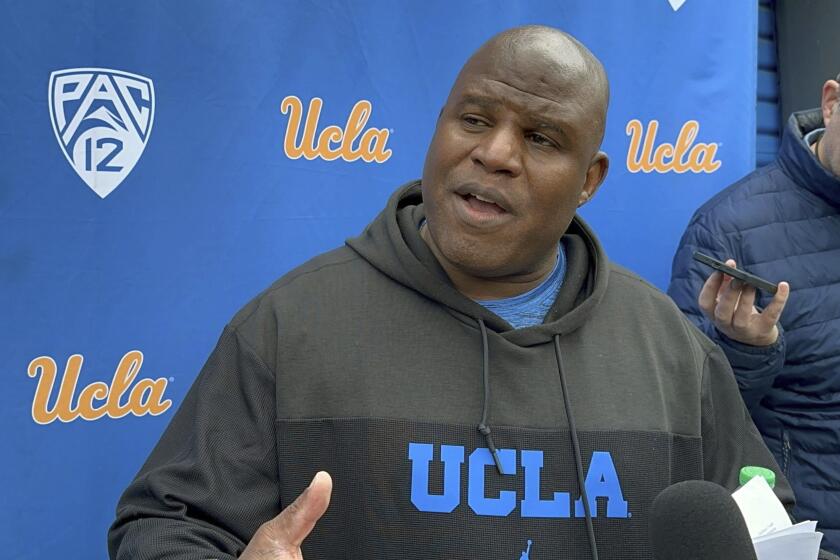Webb finally takes run at distance greatness
If there is to be a lasting highlight in an outstanding athletic career, better that it should come later than sooner.
If it comes too soon, especially when that career is in its infancy, expectations grow so big, so fast that the normal process of maturation is stunted, if not turned upside down.
So it was for Alan Webb.
Six years ago, as an 18-year-old about to graduate from high school, Webb became an instant celebrity -- hitting the morning talk shows, the athlete with enough appeal to allow a sport fading from general consciousness to recall its glory days as a major player on the U.S. sports scene.
Does anyone other than a track and field fan recall what Webb did to become famous?
Or even remember, more than vaguely, who he is?
Or realize, as the biennial World Track and Field Championships begin Saturday in Osaka, Japan, that Webb, at 24, is on the verge of becoming what so many had so quickly predicted -- the best miler in U.S. history?
Or know that, by the measure of a stopwatch, he already is the most accomplished U.S. runner in history over the greatest range of distances, from 800 to 10,000 meters?
It was easy to stop paying attention during the five seasons that followed that lasting highlight: Webb running four laps in 3 minutes 53.43 seconds, breaking Jim Ryun’s legendary 36-year-old high school record in the mile, the race that once was the race among U.S. sports fans. (Does anyone under 30 even know who Jim Ryun is?)
Webb ran in place the next two seasons, one misspent at the University of Michigan and one spent figuring out how to get back to where he had been, then the next three seasons toughening it out in a series of steps forward and back.
This outdoor season, Webb has stepped away by running, with the exception of one race, consistently fast and well.
He has the fastest times in the world in both the mile (3:46.91) and its metric version, the 1,500 meters (3:30.54) and the second fastest at 800 (1:43.84). He could finish the season as the first U.S. man with the world’s leading mile time since Joe Falcon in 1990 and the first U.S.-born-and-trained runner with the leading 1,500 time since Marty Liquori in 1971.
On Saturday, when Webb runs a first-round heat of the 1,500 meters at the world meet, he could be on the way to another “first since” distinction, the one that would be the most significant. Not since Jim Spivey’s bronze in 1987 has a U.S. man won an outdoor world championships medal in the race.
“That’s my goal. That’s the next step,” Webb said in a telephone interview before leaving for Japan. “I want to know if I am one of the best in the world, and if I get a medal at worlds, I will know it.”
And that medal, of course, will get us back to where we started, to the great expectations, to the talk of Webb coming back from the 2008 Olympics as the first U.S. medalist in the metric mile since Ryun’s silver in 1968, maybe the first U.S. gold medalist in exactly a century. Wasn’t that what was supposed to happen after he set that prep record?
“Sometimes I go back and think maybe if I hadn’t run that race in high school, there would have been less pressure, I could have developed slowly with no one watching,” Webb said. “Or maybe if I hadn’t gone to Michigan, maybe that was the answer.
“But it couldn’t have happened any other way. That race in high school inspired me, told me I could be one of the best in the world someday, if not the best. Without it, maybe I wouldn’t have kept training so hard all these years.”
That hard work was, according to both Webb and his coach, Scott Raczko, the essence of the plan they devised once Webb left Michigan and turned pro after a year of solid achievements (Big Ten cross-country and 1,500 titles as a freshman) and stunning flops (finishing ninth in the 1,500 against an undistinguished field at the Mount SAC Relays, his first outdoor track race of the season).
“I had this magical vision in my mind of how things were going to work out in college, and when that didn’t happen, I was like, ‘Oh, my gosh,’ ” Webb said.
He really uses phrases like “my gosh.” He wears his emotions on his sleeve. He hides neither angst nor joy. Sometimes they come out together, as in his explaining how his fist-pumping, thigh-pounding celebration at the end of a triumphant run in the 1,500 final at June’s U.S. Championships was due in part to his having erased worries that he would run as poorly as he had in a two-mile race in Oregon two weeks earlier.
When Webb has a bad day, it apparently still shakes his confidence, taking him back to his dismal 2002 and 2003 seasons or his failure to advance past the opening round of the 1,500 at the 2004 Olympics. (“I ran a stupid race,” he said at the time, with characteristic candor.)
“I was very discouraged,” Webb said, “but I never considered chucking it. I was too young, and I knew there was more there.”
So did Raczko, who had coached Webb at South Lakes High in Reston, Va., where the teenager ran well at distances from the 400 meters (on relays) to 5,000 meters in cross-country. Reuniting with Raczko was a key decision.
“It was a little frustrating in 2002 and 2003, as Alan deserved to have better results,” Raczko said in an e-mail. “He put a lot of pressure on himself. By the end of 2003, we both had learned a lot and were confident we had a solid plan for the next several years.”
The key to the plan was improving Webb’s strength -- not only what comes from a weight room but what comes from running longer distances in workouts and meets.
That strategy led to incremental gains for Webb in the mile during 2004 and 2005, when Webb won the U.S. titles at 1,500 and lowered his personal best in the mile to 3:48.92. The dramatic improvement was in the 5,000 and 10,000. In 2005, he became the sixth-fastest U.S. runner at 5,000 and in 2006, the eighth fastest at 10,000.
“If someone had told me five years ago I could run sub-1:44 for 800 and 27:30 for 10,000, I never would have believed it,” Webb said. “I had an idea what it would take to do it in the 800 but no expectations about 10,000.”
His startling 10,000 turned out to be the only highlight of a 2006 season cut short by anemia and a strained hamstring. Last winter, Webb showed those setbacks were short-lived and his focus had returned to the mile when he ran two sub-3:57s indoors.
The strength regimen has given him the ability to do workouts this spring that mixed volume and speed, such as four one-mile repeats between 4:20 and 4:10, with only three minutes’ rest between them. It has also allowed him to use his speed at the end of races, in which he previously had run to the lead and tried to hang on.
So it was that Webb outran 2004 Olympic silver medalist Bernard Lagat in the stretch of the fastest 1,500 at the U.S. Championships and, at a pace that produced his world-leading time; that he outkicked 2006 European champion Mehdi Baala of France in the final 20 meters of the 1,500 at the Paris Golden League meet two weeks later; that he lowered his personal best for the 800, a race he rarely runs, by 2 1/2 seconds at a low-key meet in Belgium a week after breaking Steve Scott’s 25-year-old U.S. record in the mile by .78 seconds at a similar level Belgian meet.
The inevitable followed on the Internet. “The unfortunate question is,” wrote one poster to a track website, “is Alan Webb doping?” In a sport beset by drug use, such questions cannot be avoided.
“Alan is clean,” Raczko said. “He has followed a progression of improvement which can be attributed to his talent and work ethic.”
At a distance where North Africans Noureddine Morceli and Hicham El Guerrouj had set world records before turning 24, there is nothing about Webb’s progression to suggest this year is an anomaly for which doping would be an explanation. He has lowered personal bests for both the 1,500 and mile by two seconds each at an age where such breakthroughs can be expected.
What is more significant, in terms of his career, is that Webb not only is running fast, which he has done before, but beating world-class opposition. Which leaves the other inevitable question: Olympic gold?
“It’s so hard for that to be a solid goal,” Webb said. “It’s like I have to win the Super Bowl, but only in a special year.”
Not sooner, nor later.
--
Philip Hersh covers Olympic sports for The Times and the Chicago Tribune.
--
(BEGIN TEXT OF INFOBOX)
Fast track
A look at some of Alan Webb’s top results:
*--* Event Personal best WR 2007 WR all time U.S. rank all time 800 1:43.84 (2007) 2 UR 8 1,500 3:30.54 (2007) 1 25 3 Mile 3:46.91 (2007) 1 8 1 5,000 13:10.86 (2005) N/A UR 6 10,000 27:34.72 (2006) N/A UR 8 *--*
Explanation: Rankings are by performer, not performance; WR -- world rank; UR -- not among top 75 in event; N/A -- has not run the distance this season.
Los Angeles Times
More to Read
Go beyond the scoreboard
Get the latest on L.A.'s teams in the daily Sports Report newsletter.
You may occasionally receive promotional content from the Los Angeles Times.










